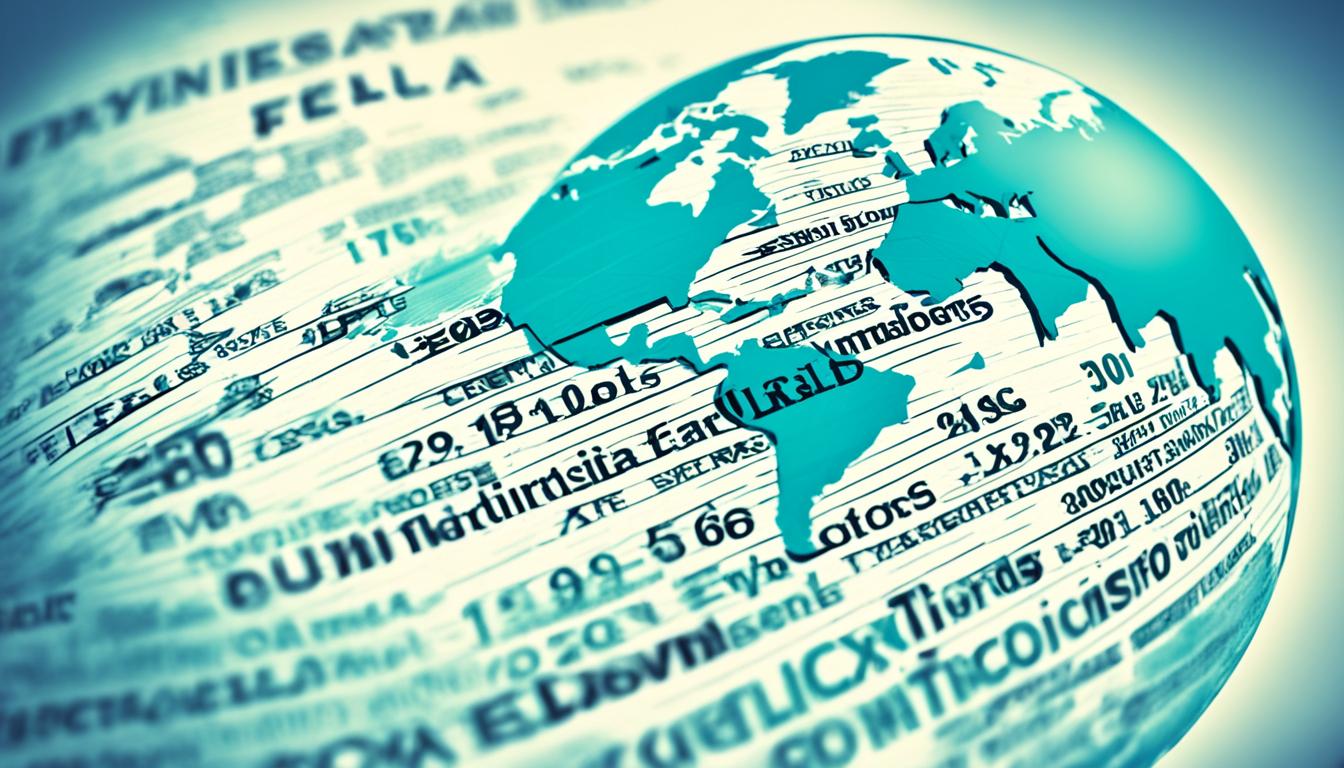The global economy greatly affects forex market trends. It’s like a complex web where every part connects to another. The global economy can cause changes that affect currency values and how traders make decisions. This part will look into how economic factors, like stability or instability, link to forex changes. We’ll use historical data and examples to show how the global economy and forex trading are connected.
Key Takeaways
- The global economy’s health has a significant impact on forex market trends.
- Macroeconomic stability or instability directly affects currency valuations.
- Understanding economic factors is crucial for effective forex trading strategies.
- Historical data and case studies provide context for examining forex fluctuations.
- Expert analyses shed light on the dynamics between the global economy and forex trading.
The impact of the global economy on forex
The global economy deeply affects the forex market. Things like trade balances, economic health, and geopolitical factors shape market trends.
How Economic Health Influences Currency Value
A nation’s economic health is key to its currency’s value. A strong economy means a strong currency as investors look for stability and growth. Important signs like GDP growth, job rates, and spending levels show how healthy an economy is.
A country with a growing GDP and low job rates usually sees its currency go up in value.
The Role of Global Trade in Forex Trends
Global trade greatly affects forex trends through imports and exports. Trade balances are crucial for currency demand. A trade surplus, where exports are more than imports, makes a nation’s currency stronger.
Foreign buyers buy more of this currency to get goods. On the other hand, trade deficits can make a currency weaker. This is because a country needs more foreign currency to buy goods.
Political Events and Their Economic Effects on Forex
Political events also play a big role in forex. Things like elections, policy changes, and treaties can make markets unstable and change currency values. For example, Brexit caused big changes in the British pound due to uncertainty about the UK’s economy.
Changes in US trade policies can also affect the forex market. They can change the value of many currencies as traders worry about the future.
Economic Indicators for Forex Trading
Understanding key economic indicators is key for making smart forex trading decisions. These indicators show how healthy a country’s economy is. They affect currency values and forex market trends.
Gross Domestic Product (GDP)
The Gross Domestic Product (GDP) shows how well a country’s economy is doing. A high GDP means a strong currency, which changes forex trends. The GDP forex impact is big because it shows a country’s economic activity and stability.
Traders look at GDP reports to guess how a currency might go up or down in value. This is based on the country’s economic health.
Inflation Rates
Inflation rates are important for knowing a currency’s value. High inflation means the currency’s value goes down. Low inflation suggests a strong currency.
Knowing about inflation and currency depreciation helps traders make better choices. They watch inflation rates to guess how exchange rates might change. This helps them plan their trades.
Employment Data
Employment stats show how strong an economy is. High employment means a strong economy and a strong currency. Rising unemployment can make a currency weaker.
Traders use employment data as part of their forex trading signals. They look at employment trends to predict currency movements. This is a big part of making forex decisions.
| Indicator | Impact on Forex | Relevance |
|---|---|---|
| GDP | Directly influences currency strength | High |
| Inflation Rates | Affects purchasing power and exchange rates | High |
| Employment Data | Reflects economic health and currency trends | Moderate |
Global Economic Outlook and Forex
The global economic outlook is key to understanding forex trends. Traders use forex forecasting to guess market moves. They look at both short-term and long-term economic trends. This part shows how the current economy affects forex volatility.
Short-term vs Long-term Outlook
Short-term outlooks focus on things like job numbers and inflation. These can cause quick changes in currency values. Long-term outlooks look at things like steady economic growth and political stability. They give a wider view on how currencies might change.
Impact of Economic Policies

Role of Central Banks
Central banks and forex markets work closely together. What central banks do, like change interest rates, is crucial for the market. For example, raising interest rates by the Federal Reserve can make the USD stronger by drawing in foreign investment. Lowering rates can make a currency weaker as investments leave. Central banks use monetary policy to keep their economy stable and influence global currency markets.
Currency Exchange Rates and Global Economy
The relationship between currency exchange rates and the global economy is deeply connected. Major and minor currency pairs change often, affected by the global economy’s details. Forex traders need to watch these changes to plan well.
Things like forex market liquidity and investor feelings greatly affect exchange rates. When markets are more liquid, currency pairs tend to be more stable. This makes it easier for traders to guess price changes. But, less liquidity can cause big price swings.
It’s key for traders to understand how the global economy affects forex. Changes in emerging markets can cause big shifts in currency pairs. These changes often show big trends in the global economy, helping traders guess future movements.
Here are important things to remember when looking at currency exchange rates:
- Balanced forex market liquidity means more predictable trends.
- Exchange rate changes are closely linked to the global economy.
- Emerging markets can greatly affect currency pairs.
To get a better understanding, look at how these elements work together. Here’s a simple table to show their connections:
| Element | Impact on Currency Pairs | Example |
|---|---|---|
| Exchange Rate Fluctuations | Increase in volatility | USD/JPY dips during economic uncertainty |
| Forex Market Liquidity | Stability of currency pairs | EUR/USD trades more smoothly |
| Global Economic Performance | Shifts in major and minor pairs | Emerging markets affect USD/BRL |
By looking at these main points, forex traders can better understand exchange rates. This helps them make smart, profitable choices that match the global economy’s changes.
Forex Analysis In a Global Economy
Understanding the forex market in a global economy means knowing different analysis methods. Each method has its own tools and views. This helps traders make smart choices.
Technical Analysis
Forex technical indicators like moving averages and Fibonacci retracement help traders. They look at past price data. This method uses charts and stats to guess future prices.
Fundamental Analysis
Fundamental analysis looks at big economic factors. It considers things like GDP growth, interest rates, and job numbers. This approach uses economic reports to understand the market’s health and future changes.
Sentiment Analysis
Sentiment analysis in forex is about reading trader feelings. Tools like the Commitment of Traders (COT) report show market mood. Knowing if traders are scared or hopeful helps predict market moves and plan trades.
Here is a comparative table of the three types of analyses:
| Analysis Type | Focus Area | Primary Tools |
|---|---|---|
| Technical Analysis | Historical Price Data | Moving Averages, Fibonacci Retracement |
| Fundamental Analysis | Economic Indicators | GDP, Interest Rates, Employment Data |
| Sentiment Analysis | Market Emotion | COT Report, Surveys |
Conclusion
This article has shown how the global economy deeply affects forex trends. Traders need to stay alert and adjust to changes in the global economy. Things like economic health, global trade, and political events change currency values.
Important economic signs like GDP, inflation, and job numbers help predict the forex market’s future. The global economic outlook is also key, shaped by economic policies and central banks. For smart forex trading, combining technical, fundamental, and sentiment analysis is essential.
Knowing about global economic trends and how they affect the forex market is key for trading success. Staying updated on economic indicators and world events helps traders make better decisions. As the global economy changes, being proactive and informed is vital for doing well in forex trading.
FAQ
How does the global economy impact forex market trends?
The global economy greatly impacts forex market trends. Factors like macroeconomic stability, trade balances, and political events play a big role. These factors can cause currency values to change and affect trading strategies.
What are the main economic factors affecting forex markets?
Important economic factors include GDP, inflation rates, employment data, and economic policies. These indicators help traders predict currency movements and understand the economy’s state.
How do political events influence forex markets?
Political events like elections and policy changes can make forex markets volatile. They can change economic policies and investor feelings, leading to currency value changes.
What are the essential economic indicators for forex trading?
Key indicators for forex trading are GDP, inflation rates, and employment stats. They show a country’s economic health and help predict currency movements.
How does the global economic outlook affect forex trading?
The global economic outlook shapes forex trading by setting market expectations and influencing investor actions. Economic forecasts, policies, and central bank actions lead to forex volatility and strategies.
How do currency exchange rates correlate with the global economy?
Currency exchange rates are linked to the global economy. Market liquidity, investor feelings, and economic performance of major and emerging markets affect exchange rate changes.
What types of analysis are crucial for forex trading in a global economy?
Important analysis types for forex trading are technical, fundamental, and sentiment analysis. Each method gives different insights into market trends and trader psychology, helping to forecast market movements.





